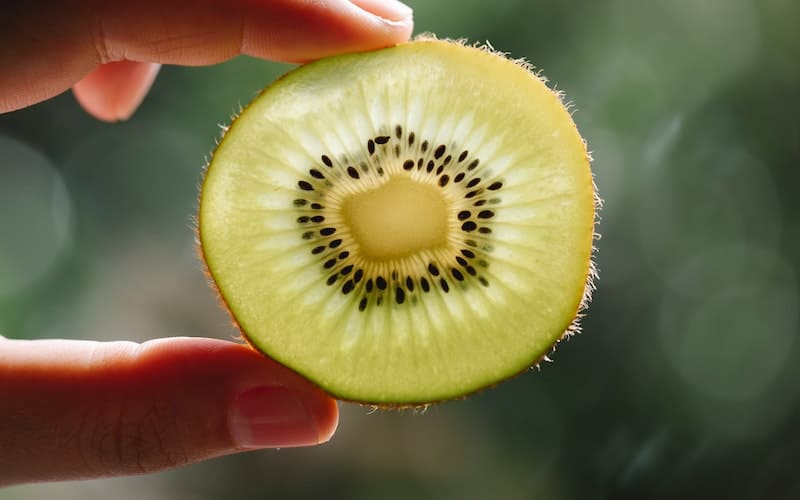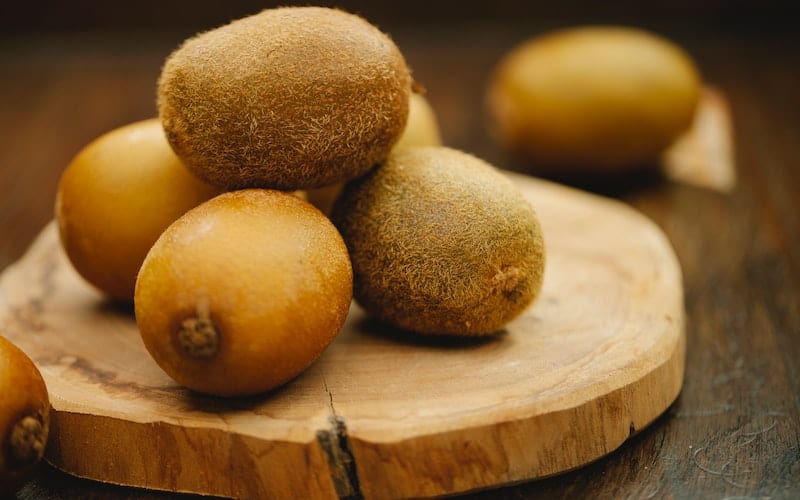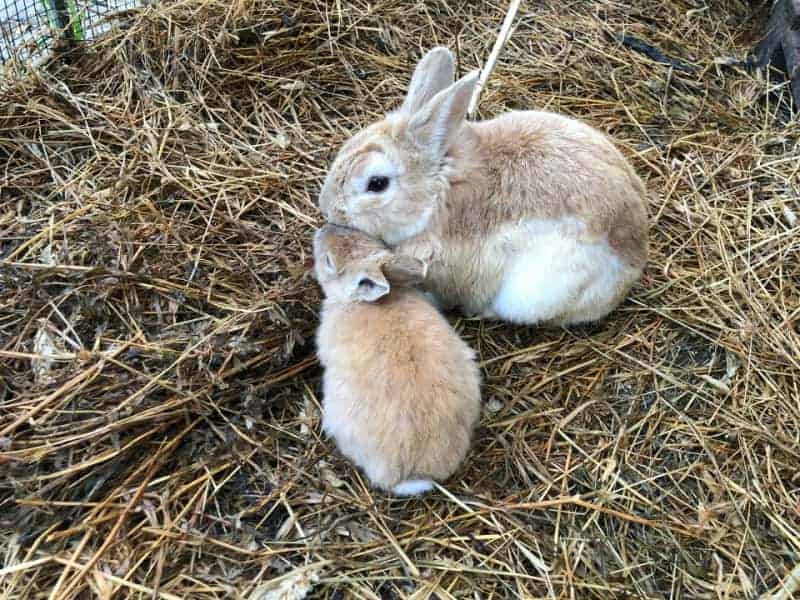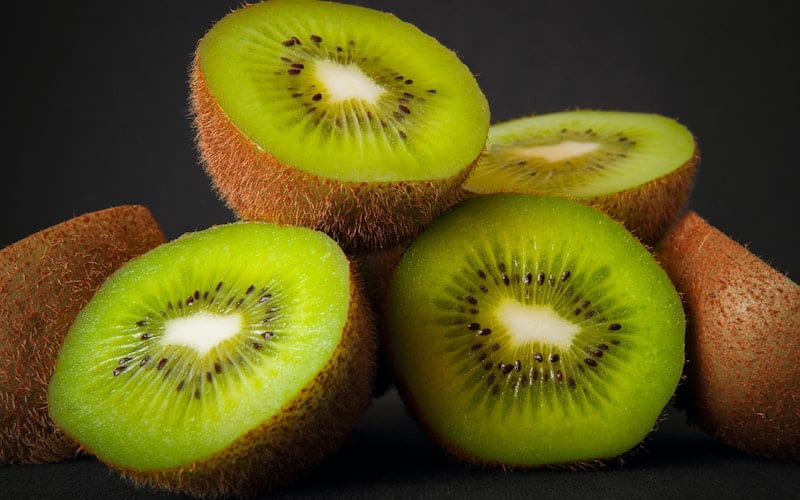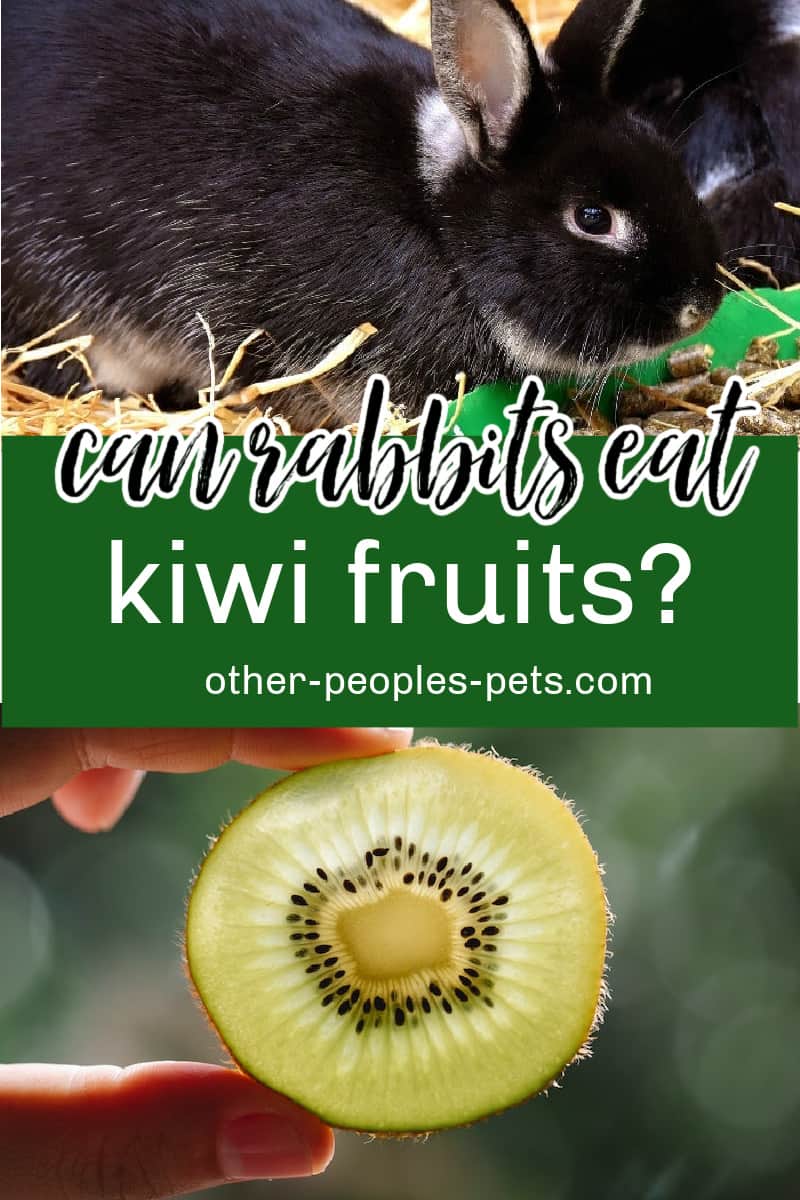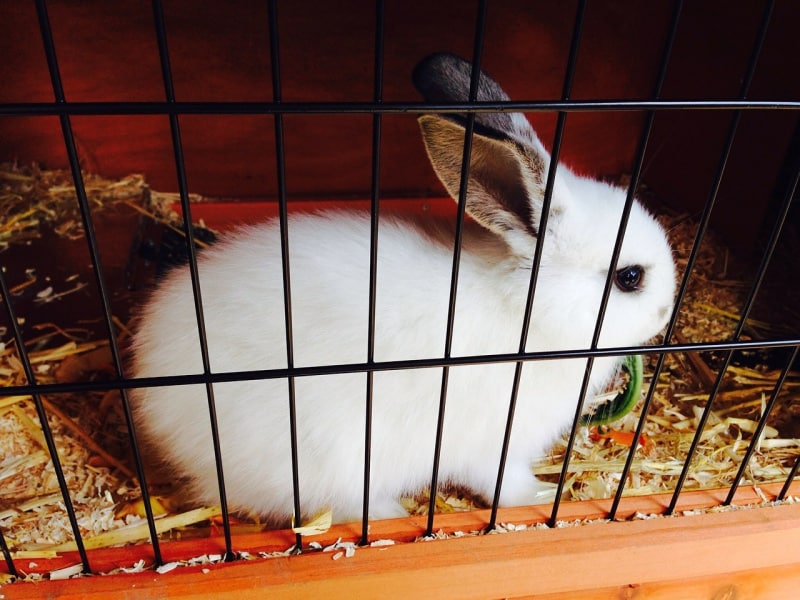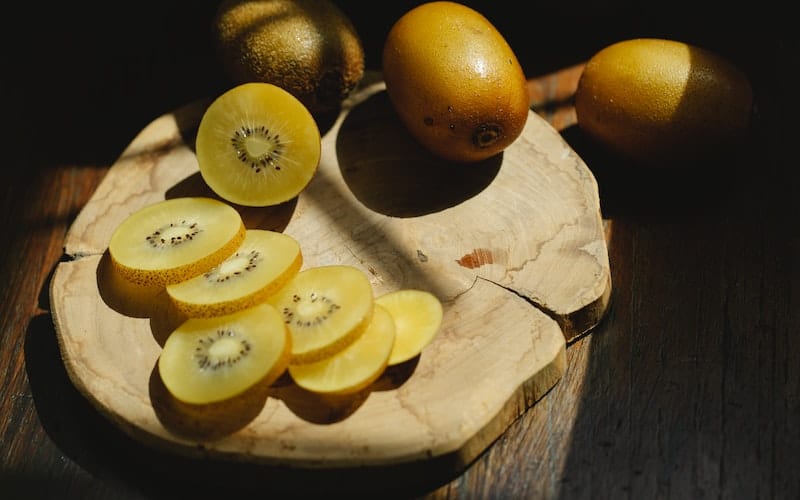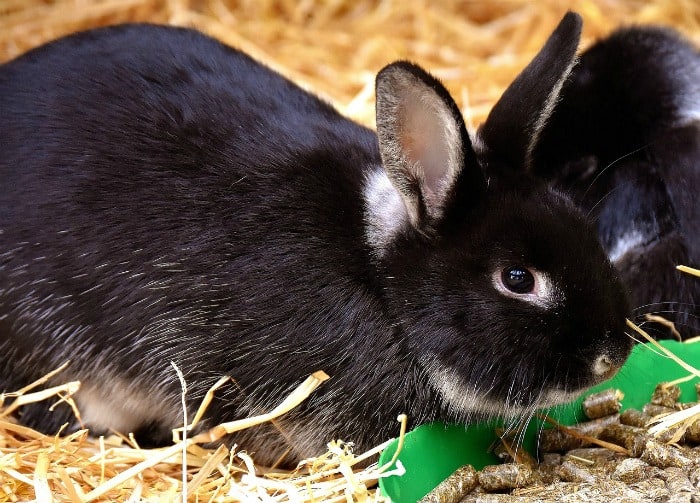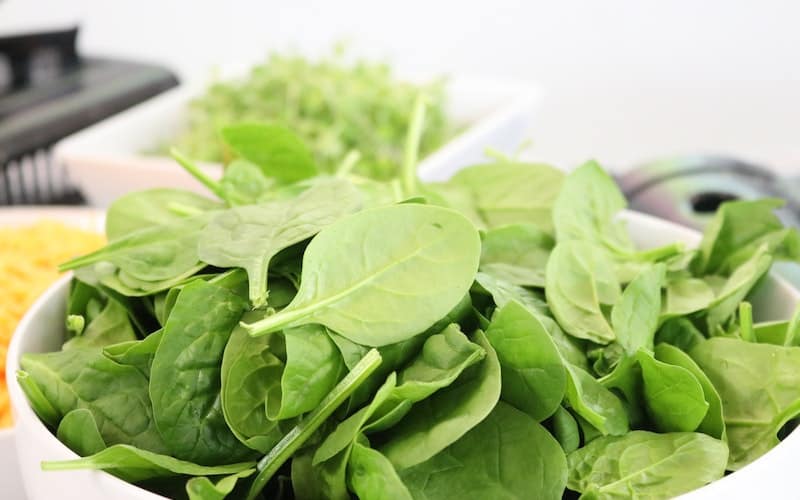Last Updated on August 27, 2023 by ellen
So, can rabbits eat kiwi fruit? Keep reading to learn more about what rabbits can eat safely and if you should include kiwi in a rabbits diet.
Posts may be sponsored. This post contains affiliate links, which means I will make a commission at no extra cost to you should you click through and make a purchase. As an Amazon Associate I earn from qualifying purchases.
Table of Contents
Can Rabbits Eat Kiwi Fruit?
While most of your rabbit’s diet should be made up of rabbit pellet food, treating your pet to fruits and vegetables can be a nice treat. But, can rabbits eat kiwi?
When it comes to giving your rabbit a diverse diet, many pet owners often wonder about which fruits are safe to include. Kiwi, with its sweet tangy flavor, is a fruit that raises particular interest.
But is it really safe for your furry friend? In this blog, we will dive into the question: Can rabbits eat kiwi fruit?
We’ll explore the benefits and potential risks, offering you a comprehensive guide to help ensure that your rabbit enjoys a healthy and balanced diet.
Do rabbits eat kiwis in the wild?
In the wild, rabbits predominantly consume a diet of grasses, leaves, and some root vegetables. They are herbivores. So, their digestive system is primarily designed to process such diet.
It’s important to note that kiwi is a fruit that is native to a few countries in the eastern hemisphere,. But, it’s not naturally found in the environments where most wild rabbits live.
So, this means that it’s highly unlikely for a wild rabbit to come across a kiwi fruit in its natural habitat. However, this doesn’t necessarily mean that kiwi is harmful to rabbits.
Domesticated rabbits have a slightly different diet as compared to their wild counterparts. They can safely rsy a wide variety of fruits and vegetables in moderation, possibly including kiwi.
The key is moderation, as too much of any fruit can upset a rabbit’s delicate digestive system due to its high sugar content. It’s always best to consult with a veterinarian before introducing a new food into your rabbit’s diet.
Can rabbits eat kiwi?
Yes, rabbits can eat kiwi but in moderation. Kiwi fruit is safe for your rabbit to consume, but it should be given as a treat and not as a main component of their diet.
The high sugar content in kiwi, as in many fruits, can be unhealthy for rabbits if consumed in large quantities. Too much sugar can lead to health issues like obesity and digestion problems.
If you want to give your rabbit a healthy treat, these timothy hay sticks are a great choice.
When feeding your rabbit kiwi, make sure to wash the fruit thoroughly to remove any pesticides or chemicals on the skin. It’s best to serve the kiwi in small, bite-sized pieces which are easier for your rabbit to eat.
It’s also important to remove the seeds and peel, as they can be hard for rabbits to digest.
Remember, while kiwi fruit can be a nice treat, the majority of your rabbit’s diet should still be made up of hay, water, and rabbit pellets.
While fruits like kiwi are safe to give to your rabbit, they should be treated as a supplemental part of their diet and not replace the essential nutrients they get from their primary food sources.
Can rabbits eat kiwi skin?
The skin of the kiwi fruit is generally not recommended for rabbits. Although it’s not toxic, the tough, fibrous nature of the kiwi fruit skin could potentially cause digestive upset.
Additionally, the kiwi skin might have residues of pesticides or other harmful chemicals, even after thorough washing, which could be harmful to your rabbit’s health.
Therefore, it’s generally best to peel the kiwi fruit before offering it to your rabbit. This ensures that your rabbit only consumes the soft, sweet flesh, which is easier to chew and digest.
Always remember though, kiwi is a treat and should be given in moderation as part of a balanced diet that primarily includes hay, water, and rabbit pellets.
Can rabbits eat kiwi seeds?
Kiwi seeds are small and generally do not pose a choking hazard. However, they can be slightly harder for a rabbit to digest compared to the soft fruit flesh.
Therefore, it is usually recommended to remove them or at least limit their consumption. While the seeds aren’t toxic or dangerous, it’s always best to err on the side of caution when it comes to your rabbit’s health.
Furthermore, removing the seeds ensures that your rabbit will ingest less sugar, as the concentration of sugar is higher in the fruit’s center where the seeds are located.
This helps avoid potential health issues related to excessive sugar intake, such as obesity and digestive problems. The bottom line is, while kiwi seeds aren’t necessarily harmful, it’s best to stick to the fruit’s flesh for your rabbit’s occasional treat.
How often can I feed my rabbit kiwi fruit?
Kiwi fruit can make a tasty and enjoyable treat for your rabbit, but it’s essential to remember the adage, “moderation is key.” Considering kiwi fruits’ high sugar content, it should only be given sparingly to avoid health concerns such as obesity and digestive issues.
A good rule of thumb is to feed your rabbit kiwi once or twice a week at most, with each serving being no larger than a teaspoon-sized amount.
Remember, the primary diet for a rabbit should consist of hay, water, and rabbit pellets. Treats like kiwi are a fun addition to your rabbit’s diet but should never serve as a substitute for their primary food sources.
Always observe your rabbit after introducing any new food item. If you notice any changes in their behavior or signs of digestive upset, discontinue the new food and consult a vet.
If you want to give your rabbit a healthy treat, these timothy hay sticks are a great choice.
Can my rabbit eat dried kiwi?
Dried kiwi, much like the fresh version, can be given to your rabbit but in even smaller amounts. Drying the fruit essentially removes water content, concentrating the sugar levels.
This high sugar content can pose potential health risks if consumed in large amounts, leading to obesity and digestion problems in rabbits.
Therefore, if you decide to offer dried kiwi, it should be an infrequent treat and only in small quantities. Also, it is important to choose dried kiwi that has no added sugars or preservatives that can be harmful to your rabbit’s health.
As always, remember that the primary diet for a rabbit should be hay, water, and pet rabbit pellets. Treats like dried kiwi should be used sparingly and never replace their primary food sources.
Can baby bunnies eat kiwi fruits?
Baby bunnies, often referred to as kits, have a different dietary requirement compared to adult rabbits. Their digestive systems are quite delicate. They are primarily accustomed to their mother’s milk during the first weeks of life.
Therefore, introducing fruits like kiwi should be done cautiously, and typically only after they have been weaned and introduced to solid foods such as hay and pellets.
As for the question, can baby bunnies eat kiwi fruits? Yes, they can, but only in very small amounts and ideally not until they are at least 12 weeks old.
Even then, it should be introduced slowly and given in moderation. Too much fruit can upset a young rabbit’s digestive system, potentially leading to health issues.
Always monitor for any changes in their behavior or bowel movements when introducing new foods, and if in doubt, consult with a knowledgeable vet.
Fresh fruits and vegetables that are good for rabbits
In addition to kiwi, there are numerous fresh fruits and vegetables that can be beneficial for your rabbit’s health when given in moderation as part of a balanced diet. Always introduce new foods gradually and monitor your rabbit for any negative reactions.
Apples: Rich in fiber but remember to remove the seeds as they are toxic.
Blueberries: Packed with antioxidants, they’re a great occasional treat.
Carrots: Despite popular belief, carrots should be given sparingly due to their high sugar content.
Leafy Greens: Romaine lettuce, kale, and spinach can be part of their daily diet.
Pears: Make sure to remove the seeds before offering to your bunny.
Peaches: Another sweet treat, but make sure to remove the pit.
Pumpkin: This can help with digestive issues, but should be given in moderation.
Bell Peppers: A good source of vitamin C but avoid the hot varieties.
Zucchini: This can be given regularly due to its low sugar content.
Broccoli: Though a good source of nutrients, it can cause gas if given in excess, so moderate the intake.
Remember that fresh vegetables are always best.
What fruits can bunnies not eat?
Rabbits can eat a variety of fruits. But, you should avoid certain types to prevent health issues. Here are ten fruits that are not suitable for rabbits:
Avocados: These are high in fat and can cause digestive issues.
Grapes/Raisins: These fruits are too high in sugar and can lead to obesity and other health problems.
Citrus Fruits: The high acidity can upset your rabbit’s stomach.
Onions: They are toxic to rabbits and can lead to anemia.
Garlic: This is also toxic to rabbits and can cause blood disorders.
Tomatoes: While technically a fruit, the green parts of the tomato plant are toxic.
Cherries: The pits contain cyanide and can be dangerous if accidentally ingested.
Rhubarb: The leaves and stems are toxic to rabbits.
Peaches and Plums: The pits in these fruits contain cyanide.
Banana Peels: While rabbits can eat small amounts of banana, the peels can be hard to digest.
In conclusion, while it’s appealing to provide your furry friend with a variety of treats, remember that not all fruits are suitable for rabbits. Kiwi can be a delightful treat for your bunny. But, you should give fruits in moderation due to the high sugar content.
Baby bunnies can also enjoy kiwi, but only after they reach the appropriate age and in small quantities. Whether it’s fresh or dried, always ensure any kiwi has no added sugars or harmful preservatives.
And remember, while fruits add variety to your rabbit’s diet, their main meals should always consist of hay, water, and rabbit pellets. Your bunny’s health is paramount, so when in doubt about a new food, it’s always wise to consult with your vet. Happy feeding!
If you want to give your rabbit a healthy treat, these timothy hay sticks are a great choice.
Related Reading
You may also enjoy these:
Are rabbits good pets for children

Ellen runs a small pet sitting business in southern Vermont. She has experience with a variety of small animals, dogs and cats. She has also cared for ducks, chickens and rabbits. Combined, she has over 20 years of experience in pet care and pet sitting.
